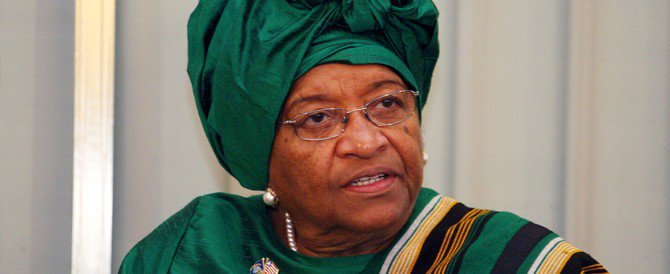Ten years after Liberia’s civil war, the government of President Ellen Johnson Sirleaf is held up as an example of how reformist leadership can bring peace and democracy to a devastated country. However, recent persecution of civil society groups in Liberia, capped by troubling statements by the President, suggests that the country’s government no longer respects civil society independence. At the same time, the Liberian government has also reacted positively to some concerns raised by civil society groups, promising people living on a large palm oil plantation that their lands would be respected.
How should NGOs and the international community unpick these mixed signals?
 This past January, Liberian President Johnson Sirleaf paused during her marathon annual address to fire a warning shot across the bow of Liberian civil society. Some civil society groups, she claimed, were seeking, “to become super-national bodies challenging national sovereignty.” The reaction among Liberian civil society groups was swift. Leymah Gbowee, who shared the 2011 Nobel Peace Prize with President Johnson Sirleaf, reportedly called her remarks “a little bit edgy and unsettling.”
This past January, Liberian President Johnson Sirleaf paused during her marathon annual address to fire a warning shot across the bow of Liberian civil society. Some civil society groups, she claimed, were seeking, “to become super-national bodies challenging national sovereignty.” The reaction among Liberian civil society groups was swift. Leymah Gbowee, who shared the 2011 Nobel Peace Prize with President Johnson Sirleaf, reportedly called her remarks “a little bit edgy and unsettling.”
There are two possible explanations for the President’s warning. Like many governments, Liberia’s is not fond of criticism, and has recently been subject to a number of embarrassing NGO exposés on issues such as prison conditions and police corruption.
The President’s statement may, however, have a more troubling root. In February, she repeated her address in Liberian English and criticized NGOs for harming Liberia’s economy. According to the President, concerns raised by civil society groups that companies were abusing communities in palm oil plantations or breaking the law in logging concessions were not valid. Instead, civil society should be quiet and leave companies to operate, even though they had not yet proven their ability to deliver promised revenues.
Recent events suggest that this attitude is shared by many in government. The President’s speech took place amid a flurry of altercations between government officials, the press, and civil society groups. In May of last year, the President’s chief of security took the opportunity presented by World Press Freedom Day to threaten Liberia’s journalists: “You have your pen, we have our guns.” Three months later, leading journalist Rodney Sieh was imprisoned for two months having failed to pay an extortionate US$ 1.5 million penalty arising from a libel suit with former Agriculture Minister Christopher Toe.
The government pushback is not limited to the press. In September of last year, 17 citizens of Grand Bassa County were beaten by police and company security forces while protesting the encroachment onto their land of the Equatorial Palm Oil plantation. In a similar incident in February, two people in Sinoe County were arrested after asking questions about the expansion of the Golden Veroleum palm oil planation. In the same month, a community leader was fired from his government job after holding meetings where people aired grievances about a logging company operating in their forest.
Is this evidence of a government clampdown?
The situation isn’t that clear cut. Compared to her neighbours, Liberia has a relatively free press, with newspapers and radio stations operating across the country. Liberia also hosts an extraordinarily large number of NGOs: by government estimates nearly 1000 in a country of only 3.7 million. The community members who were arrested were also released from custody without charge, and the fired community leader later rehired.
The government has also taken impressive steps towards improving natural resource governance, in part at the behest of Liberian civil society groups. In February, the Ministry of Justice indicted eight former officials for facilitating illegal logging licenses, a scandal that came to light thanks to research conducted by Liberian NGOs and Global Witness. Then, earlier this month, the President acknowledged the demands of community members who had protested about the Equatorial Palm Oil plantation and stated that the company would not be allowed to expand onto their land without community approval.
These mixed signals suggest that the Liberian government is currently struggling to find a balance between three interests. After the country’s crippling civil war, Liberian officials have little experience working with a vibrant civil society. The government is also desperate for investment and will view any reports that companies may be doing more harm than good as a threat to development. At the same time, officials have been willing, on occasion, to acknowledge the useful watchdog role civil society groups can play. Ultimately, the jury is still out as to whether or not Liberia comes down on the side of respecting civil society independence.
It is here that the President Johnson Sirleaf’s annual message is particularly damaging. She may sometimes listen to what civil society groups say, but the message she has sent to her government is that such groups are obstructive and need not be tolerated. To officials unused to civil society criticism, such license is dangerous and could result in more threats against journalists and arrests of protesters. To prevent this, President Johnson Sirleaf needs to send a clear counter-signal about the important role played by civil society and why its independence must be respected.